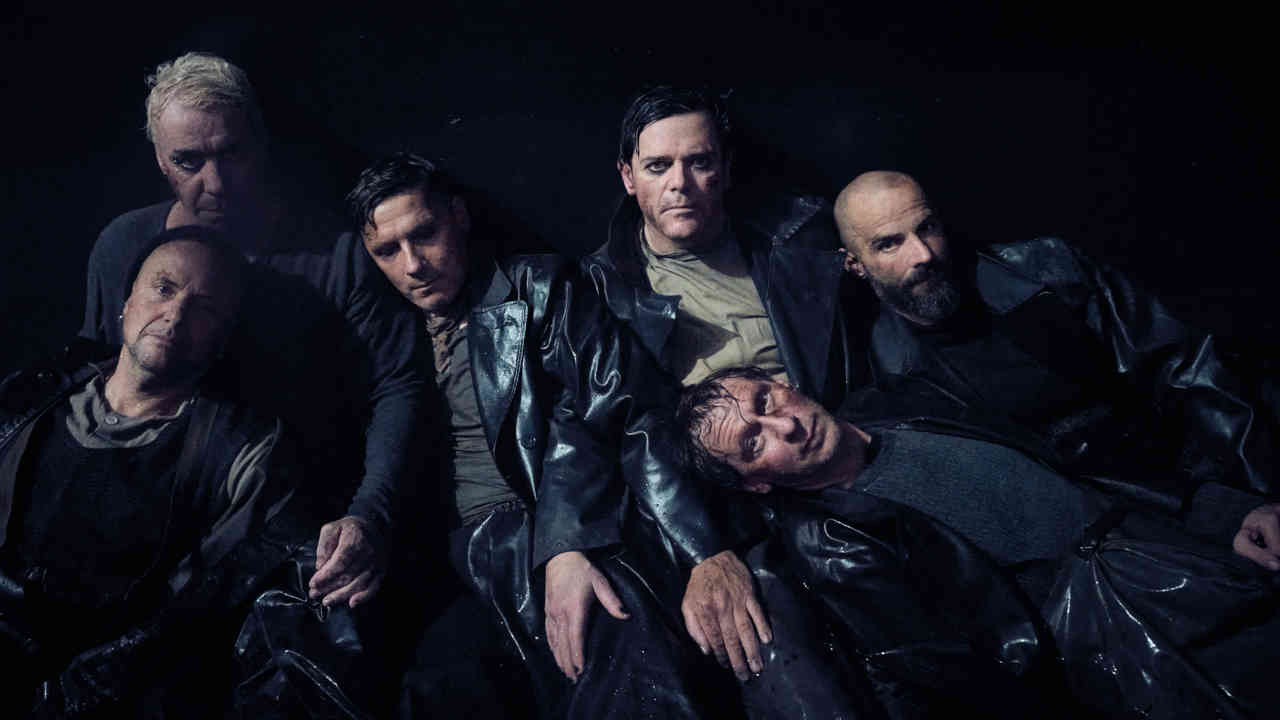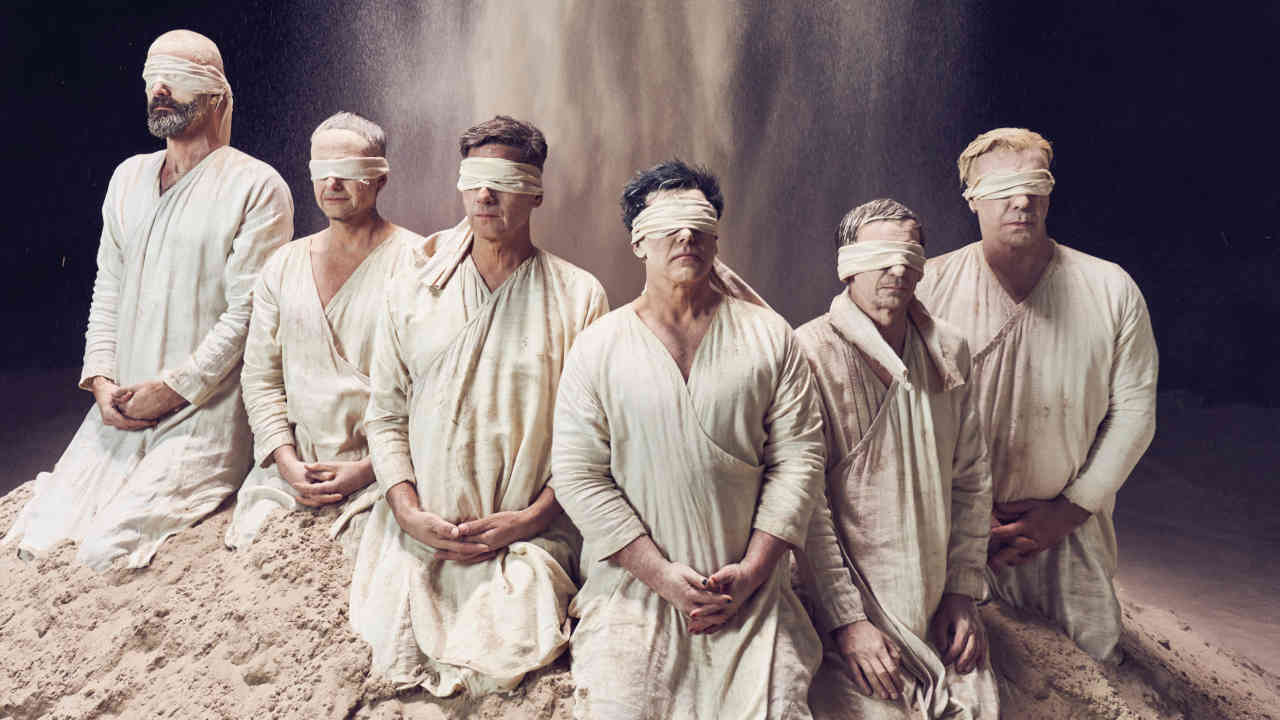Scott Ian remembers exactly where he was when he first heard Rammstein: in a prison cell. In 1996, Anthrax’s guitarist was cast as an extra in David Lynch’s dark thriller Lost Highway, and was on set to film a jail scene (cut from the film’s final edit) featuring fellow musician Henry Rollins and actor Bill Pullman, when a distorted guitar riff from the German band’s debut album, Herzeleid, kicked in through the sound stage’s speakers. “It was unbelievably loud,” Scott recalls. “You know when you hear about how they torture people with loud music so they can’t sleep? It was that loud. I was like, ‘What the fuck is happening here?’”
The following summer, at the With Full Force festival, held on July 5, 1997 at an airfield in Zwickau, Germany, Scott would see the band play live, ahead of the release of their second album, Sehnsucht. Rammstein’s incendiary performance on that afternoon still burns brightly in his memory today, not least because, at the time, after a decade touring the world, Scott Ian thought he had seen it all.
“I specifically remember that Till had a flamethrower and was shooting this stream of fire 50 to 60 feet out over the crowd,” he remembers. “I was like, ‘This is insane.’ It was like going to a Broadway show. And they weren’t even headlining!”
Twenty-five years on, Rammstein are no longer an unknown quantity. If not yet a household name, they can reasonably lay claim to being the biggest cult band in the world, and one of the hottest tickets on the live circuit; good luck scoring admission to any date on their upcoming European stadium tour if you haven’t already done so. And yet, despite their ascendancy into modern rock’s elite, the sextet’s capacity to surprise and unsettle remains undiminished.
That much was evident earlier this year, when, without the music industry’s standard hype or fanfare, on March 10 the group dropped the weighty, intense, symbolism-heavy video for Zeit (‘Time’), revealed as the title track of their eighth album. Abandoning conventional narrative structure, the track’s striking, surrealistic video, directed by German actor/film-maker Robert Gwisdek, is a classic Rammstein headfuck, featuring ominous cloaked figures, warring soldiers regressing to childhood, a newborn baby re-entering its mother’s vagina, and assorted vignettes pivoting on images of death and rebirth.
Within minutes of the video debuting online, Reddit threads and message boards were aflame with hardcore fans seeking to unlock its mysteries; faced with lyrics such as ‘Wenn unsere zeit gekommen ist, dann ist es zeit zu gehen’ (‘When our time has come, then it is time to go’) some remain convinced that Rammstein are intimating that their own life cycle is winding inexorably to its conclusion. Quite possibly relishing the confusion sown, the enigmatic Berliners have done nothing to address such speculation: in fact, as with the low-key, understated launch of their untitled album in May 2019, the group have elected to share their new album with the world entirely devoid of commentary, context or explication.
Instead, when fielding media requests for interviews, they’ve collectively nominated Robert Gwisdek, the 38-year-old director of the Zeit video, to share his personal perspectives on Rammstein 2022 in their stead, a duty the native Berliner undertakes with grace and no little charm.
“Zeit isn’t about getting older, so much as it’s a contemplation of time itself,” he clarifies in conversation with Hammer. “The idea isn’t that things are ending. Rather, that things progress through the river of time and there is no ending, just different stages.”
“People think they know Rammstein because of videos like Pussy or Deutschland, but then they’ll do something like surfing in a tiny boat while waving an LGBTQ+ flag,” he adds. “The funny thing about Rammstein is that they are still evolving, they aren’t being left behind by the times.”

If Rammstein’s reluctance to grant interviews in the run-up to the release of Zeit helps maintain a sense of intrigue around the collective and their motivations, their actions often speak louder than words ever could. While some of their arch provocations are served up with a sense of theatre and knowing humour, in recent years the sextet have been unafraid to use their platform to highlight human rights abuses, injustice and intolerance.
They have been vocal in their unambiguous support for LGBTQ+ causes – guitarists Richard Kruspe and Paul Landers drawing global attention to the hostility faced by the LGBTQ+ community in Russia after sharing a kiss onstage during a July 2019 performance in Moscow – and equally committed in expressing their support for Ukraine in the wake of the Russian invasion in February 2022, Till cancelling scheduled shows in Russia in a show of solidarity with the under siege nation. Alongside members of Faith No More, Agnostic Front, Stabbing Westward and more, guitarist Richard Kruspe recently contributed to a charity single recording of The Beatles’ Come Together, with all proceeds from sales earmarked for humanitarian aid projects in Ukraine. And in March, vocalist Till Lindemann was spotted greeting refugees in Berlin to assist them in finding accommodation.
In the light of this activism, one might perhaps envisage that Zeit would be rooted in the six musicians’ heightened determination to expose and critique humanity’s darkest urges and most base compulsion. Given that 9.5 years separated the release of the untitled album and its predecessor, 2009’s Liebe ist für alle da, one might even be tempted to view Rammstein’s surprise return in 2022 as a physical reiteration of their long-standing commitment to the pursuit of freedom, individualism and the celebration of life lived free from shame, apology or regret. And then one might glance at Till Lindemann’s lyrics for new songs OK (shorthand for ‘Ohne Kondom’, without a condom in English) and Dicke Titten (translated as, er, Big Tits) and remember that trying to second-guess Rammstein is a fool’s game.
To this writer, Zeit is the sound of a band that blew up the world taking time to sift through the ashes. In terms of the Rammstein canon, its songs share most DNA with Untitled, or 2005’s Rosenrot, being largely more nuanced, reflective and existential than explosive/provocative past efforts such as Feuer Frei! or Pussy.
But there are gloriously batshit moments, too. A satirical analysis of society’s obsession with conventional beauty – and presumably people’s desire to stave off time’s effect on their appearance – new single Zick Zack features lyrics such as ‘Belly fat into the organic waste bin/Now the penis sees the sun again’, while the unapologetically bawdy Dicke Titten commences with full oompah-style brass for the intro, because… Rammstein. The musical cherry on top is the utterly enormous riff that kicks off album closer Adieu, its echoes of Led Zeppelin’s monumental Kashmir a knowing and respectful nod to one of rock’s original stadium acts.
And that’s just a surface reading of this intriguing and engaging work. Mindful that some of the subtleties and nuances woven into Rammstein’s multi-layered art can bypass those of us not blessed with a comprehensive understanding of German art, history, culture and linguistics, we sought out an expert in the field, Karen Leeder, Professor of Modern German Literature, and Fellow and Tutor in German at New College, Oxford, for a deep dive into Till Lindemann’s dark, expressive poetry.
The Professor’s incisive analysis reveals the true depth and range of Zeit, from the call to arms of Armee Der Tristen (‘Army of the Dreary’) – “a rallying cry for the forlorn and abandoned,” she explains, featuring a nod to the Communist Party Worker’s United Front Song, written by Bertolt Brecht, and referenced on 2001’s Mutter – to the deceptively straightforward Angst (‘Fear’), wherein a traditional playground game offers a familiar starting point for a dark parable on intolerance in Europe. Then there’s the unsettling domestic drama of Meine Tranen (‘My Tears’).
“Rammstein fans will recognise another metaphorical matricide,” says the Professor. “This one sets the scene with a mother and her son, now a grown man, still living together in a claustrophobic relationship in a house that is too small. They are alone and silent, but this is also a brutalising relationship; the mother figure strikes the son’s face and demands that he does not cry.”
When they first assembled in 1994 in a rehearsal studio in Prenzlauer Berg, Berlin, the six members of Rammstein shared a disdain for orthodoxy, a hatred of conformity, and an enthusiasm for disruption and provocation.
“We’re here to cause problems, to cause trouble,” Paul Landers told a UK magazine in 2001. “I like the fact that some people hate us. We’re artists, and art should cause such feelings.”
All these years later, as is evident on Zeit, Rammstein’s guiding principles remain in place. Now a band with millions of fans around the world (with 40,000 tuning in on YouTube just to watch the premiere of the Zeit video), they also possess enough mystery to hark back to the unknowable rock and metal gods who conquered the earth half a century ago. And, in Zeit’s potent video and music, Rammstein in 2022 have given us all pause for reflection – and yet more surprise.
“I was really touched because there was a huge article in a German newspaper that basically talked about how during a time when there are wars starting, we have these images of children holding guns at each other, that hit an emotional note in us to remind us that we’re all somebody’s children,” says Robert Gwisdek of the current climate. “Who’d have thought this band who’ve played with violence so much would be comforting us in a time where we’re all so unsure of the world? There is a surprise in the reception to this video, as people weren’t expecting to get so emotional!”

